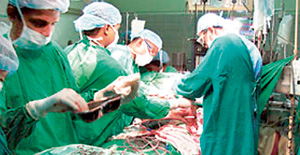The ability to recognize complications of cirrhosis has led to improved treatments aimed at preventing them.
One of the biggest advances in cirrhosis treatment is liver transplantation, a procedure in which the diseased liver is replaced with a new healthy liver.
Other advances include: use of medications (such as beta blockers) to reduce the pressure inside varices to decrease the risk of variceal bleeding; development of treatments for hepatic encephalopathy; development of treatments for underlying liver disease. Some of these may even reverse cirrhosis in its early stages.
Patients with cirrhosis should be seen regularly by their doctor, who will monitor for complications. In most cases, the following measures are recommended:
Vaccination — Patients are typically vaccinated against hepatitis A and B. Pneumococcal vaccine and yearly influenza vaccine are often recommended.
Avoid substances that can injure the liver — Patients should avoid consuming substances that can further damage the liver, the most common being alcohol. Patients should also check with their Dr. before taking any new medication (prescription, nonprescription, herbal, vitamins, supplements).
Screen for and treat varices — Patients with cirrhosis should undergo an upper endoscopy to determine if varices (expanded blood vessels) are present in the esophagus, the tube that connects the mouth and stomach.
Treat ascites and edema — Ascites and edema can lead to complications, particularly infection. Ascites can also cause a person to feel short of breath or full. Treatment is usually recommended to reduce the amount of fluid that collects in the lower legs and abdomen and involves taking diuretic pills (fluid pills) and following a low sodium (salt) diet.
 |
| SriLanka's first liver transplant in progress at the National Hospital (file pic) |
Some patients require periodic drainage of the fluid (paracentesis) - inserting a needle into the abdomen and withdrawing fluid from the space around the abdominal organs.
TIPS — A TIPS (transjugular intrahepatic portosystemic shunts) procedure may be recommended to treat ascites if diuretics, paracentesis, and changes in diet are not completely successful. Here a radiologist places a device within the liver to reduce the blood pressure in the portal vein . This is done with local anaesthesia and sedation.
Screen for liver cancer— Patients should have screening tests to detect hepatocellular carcinoma (cancer of the liver). Screening usually requires the patient to have an ultrasound examination of the liver and a blood test every 6 to 12 months.
Screen for encephalopathy — Patients can develop confusion. A change in the sleep pattern (insomnia or sleeping too much) may be an early sign. Detecting confusion is important since treatment is available and the confusion itself can lead to serious problems (eg. an automobile accident).
Dietary advice — Patients with advanced cirrhosis may require specialized diets. Salt restriction is usually recommended for patients with early cirrhosis who tend to accumulate fluid. It is important to eat a healthy diet with adequate calories and nutrient-rich foods.
Exercise — Exercise is generally safe for people without advanced stage cirrhosis. But exercise may increase the risk of variceal bleeding in patients with advanced disease (such as those who have ascites or varices).
Liver transplantation
Not all patients with cirrhosis will require a liver transplantation, and many are not eligible for one. The majority of donated livers come from people who have suffered brain death for one reason or another. More recently, living donors have been able to donate a portion of their liver.
However, the transplantation process is elaborate, involving an extensive screening process for eligibility.
New treatments— Treatments for various causes of liver disease are rapidly being developed, some of which may be helpful even after the disease has progressed to cirrhosis eg: the use of pegylated interferon plus ribavirin in patients with hepatitis C. Drugs aimed at slowing or reversing the processes leading to cirrhosis are being developed but are still many years away from being commercially available.
Family members may be at an increased risk of liver disease, depending upon the cause of the cirrhosis and should be tested for hepatitis B or C if these infections are the cause of cirrhosis. In addition, some forms of liver disease, such as Wilson's disease and hemochromatosis, are inheritable and thus may require specific testing.
|
